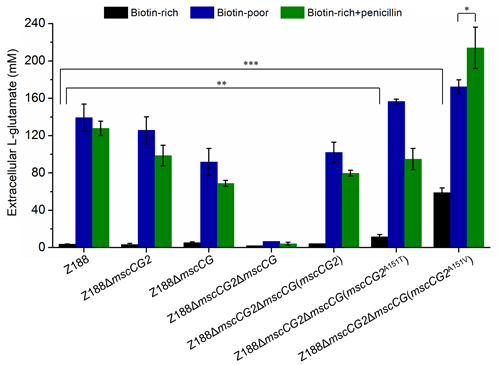Bacterial amino acid transport system is crucial for cellular metabolism and hyper-production of amino acids. Corynebacterium glutamicum is an important workhorse for industrial production of amino acids, including L-glutamate with a giant market size of approximately 2.5 million tons per year. However, transport of L-glutamate has not been well characterized and only one L-glutamate exporter (MscCG) has been discovered thus far.
Recently, a novel L-glutamate exporter of C. glutamicum (MscCG2) was discovered and characterized by Laboratory of Systems & Synthetic Biotechnology led by Prof. SUN Jibin and Prof. ZHENG Ping at Tianjin Institute of Industrial Biotechnology (TIB), Chinese Academy of Sciences. MscCG2 and MscCG differ greatly in sequence and structure and are supposed to evolve separately from each other. In glutamate hyper-producing C. glutamicum strain, MscCG2 cooperated with MscCG for rapid excretion of L-glutamate under biotin-poor conditions(See Figure below). By introducing an A151V mutation in MscCG2, constitutive excretion of L-glutamate and its analog could be realized. In addition to exporting L-glutamate, MscCG2 was proven to participate in osmoregulation, demonstrating its versatile functions.
This work will enrich the understanding of L-glutamate export. MscCG2 could serve as a new target for studying bacterial amino acid transport and engineering transport reactions for hyper-production.
The work entitled “A novel L-glutamate exporter ofCorynebacterium glutamicum ” has been published in Applied and Environmental Microbiology. Dr. WANG Yu, a research assistant of TIB, is the first author of this paper. This work was supported by the National Natural Science Foundation of China (31700044), the Key Research Program of the Chinese Academy of Sciences (ZDRW-ZS-2016-2).

Export of L-glutamate by MscCG2 and mutants (Image by TIB)
Contact:
Prof. ZHENG Ping
Tianjin Institute of Industrial Biotechnology, Chinese Academy of Sciences.
Email: zheng_p@tib.cas.cn

